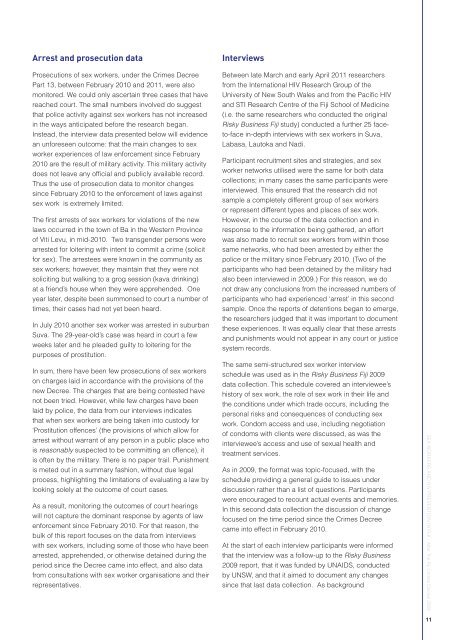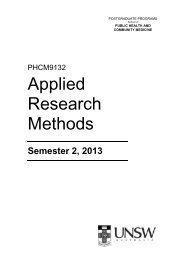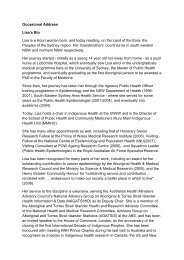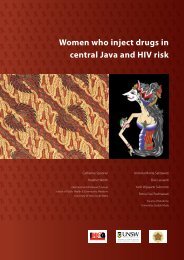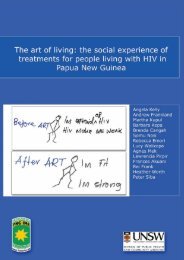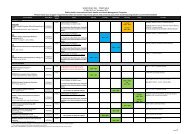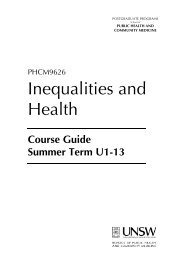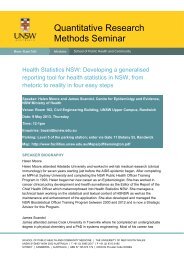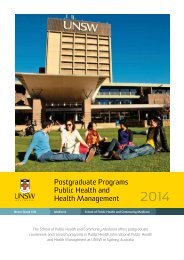Sex Workers and HIV Prevention in Fiji - after the Fiji Crimes Decree ...
Sex Workers and HIV Prevention in Fiji - after the Fiji Crimes Decree ...
Sex Workers and HIV Prevention in Fiji - after the Fiji Crimes Decree ...
You also want an ePaper? Increase the reach of your titles
YUMPU automatically turns print PDFs into web optimized ePapers that Google loves.
Arrest <strong>and</strong> prosecution dataInterviewsProsecutions of sex workers, under <strong>the</strong> <strong>Crimes</strong> <strong>Decree</strong>Part 13, between February 2010 <strong>and</strong> 2011, were alsomonitored. We could only ascerta<strong>in</strong> three cases that havereached court. The small numbers <strong>in</strong>volved do suggestthat police activity aga<strong>in</strong>st sex workers has not <strong>in</strong>creased<strong>in</strong> <strong>the</strong> ways anticipated before <strong>the</strong> research began.Instead, <strong>the</strong> <strong>in</strong>terview data presented below will evidencean unforeseen outcome: that <strong>the</strong> ma<strong>in</strong> changes to sexworker experiences of law enforcement s<strong>in</strong>ce February2010 are <strong>the</strong> result of military activity. This military activitydoes not leave any official <strong>and</strong> publicly available record.Thus <strong>the</strong> use of prosecution data to monitor changess<strong>in</strong>ce February 2010 to <strong>the</strong> enforcement of laws aga<strong>in</strong>stsex work is extremely limited.The first arrests of sex workers for violations of <strong>the</strong> newlaws occurred <strong>in</strong> <strong>the</strong> town of Ba <strong>in</strong> <strong>the</strong> Western Prov<strong>in</strong>ceof Viti Levu, <strong>in</strong> mid-2010. Two transgender persons werearrested for loiter<strong>in</strong>g with <strong>in</strong>tent to commit a crime (solicitfor sex). The arrestees were known <strong>in</strong> <strong>the</strong> community assex workers; however, <strong>the</strong>y ma<strong>in</strong>ta<strong>in</strong> that <strong>the</strong>y were notsolicit<strong>in</strong>g but walk<strong>in</strong>g to a grog session (kava dr<strong>in</strong>k<strong>in</strong>g)at a friend’s house when <strong>the</strong>y were apprehended. Oneyear later, despite been summonsed to court a number oftimes, <strong>the</strong>ir cases had not yet been heard.In July 2010 ano<strong>the</strong>r sex worker was arrested <strong>in</strong> suburbanSuva. The 29-year-old’s case was heard <strong>in</strong> court a fewweeks later <strong>and</strong> he pleaded guilty to loiter<strong>in</strong>g for <strong>the</strong>purposes of prostitution.In sum, <strong>the</strong>re have been few prosecutions of sex workerson charges laid <strong>in</strong> accordance with <strong>the</strong> provisions of <strong>the</strong>new <strong>Decree</strong>. The charges that are be<strong>in</strong>g contested havenot been tried. However, while few charges have beenlaid by police, <strong>the</strong> data from our <strong>in</strong>terviews <strong>in</strong>dicatesthat when sex workers are be<strong>in</strong>g taken <strong>in</strong>to custody for‘Prostitution offences’ (<strong>the</strong> provisions of which allow forarrest without warrant of any person <strong>in</strong> a public place whois reasonably suspected to be committ<strong>in</strong>g an offence), itis often by <strong>the</strong> military. There is no paper trail. Punishmentis meted out <strong>in</strong> a summary fashion, without due legalprocess, highlight<strong>in</strong>g <strong>the</strong> limitations of evaluat<strong>in</strong>g a law bylook<strong>in</strong>g solely at <strong>the</strong> outcome of court cases.As a result, monitor<strong>in</strong>g <strong>the</strong> outcomes of court hear<strong>in</strong>gswill not capture <strong>the</strong> dom<strong>in</strong>ant response by agents of lawenforcement s<strong>in</strong>ce February 2010. For that reason, <strong>the</strong>bulk of this report focuses on <strong>the</strong> data from <strong>in</strong>terviewswith sex workers, <strong>in</strong>clud<strong>in</strong>g some of those who have beenarrested, apprehended, or o<strong>the</strong>rwise deta<strong>in</strong>ed dur<strong>in</strong>g <strong>the</strong>period s<strong>in</strong>ce <strong>the</strong> <strong>Decree</strong> came <strong>in</strong>to effect, <strong>and</strong> also datafrom consultations with sex worker organisations <strong>and</strong> <strong>the</strong>irrepresentatives.Between late March <strong>and</strong> early April 2011 researchersfrom <strong>the</strong> International <strong>HIV</strong> Research Group of <strong>the</strong>University of New South Wales <strong>and</strong> from <strong>the</strong> Pacific <strong>HIV</strong><strong>and</strong> STI Research Centre of <strong>the</strong> <strong>Fiji</strong> School of Medic<strong>in</strong>e(i.e. <strong>the</strong> same researchers who conducted <strong>the</strong> orig<strong>in</strong>alRisky Bus<strong>in</strong>ess <strong>Fiji</strong> study) conducted a fur<strong>the</strong>r 25 faceto-face<strong>in</strong>-depth <strong>in</strong>terviews with sex workers <strong>in</strong> Suva,Labasa, Lautoka <strong>and</strong> Nadi.Participant recruitment sites <strong>and</strong> strategies, <strong>and</strong> sexworker networks utilised were <strong>the</strong> same for both datacollections; <strong>in</strong> many cases <strong>the</strong> same participants were<strong>in</strong>terviewed. This ensured that <strong>the</strong> research did notsample a completely different group of sex workersor represent different types <strong>and</strong> places of sex work.However, <strong>in</strong> <strong>the</strong> course of <strong>the</strong> data collection <strong>and</strong> <strong>in</strong>response to <strong>the</strong> <strong>in</strong>formation be<strong>in</strong>g ga<strong>the</strong>red, an effortwas also made to recruit sex workers from with<strong>in</strong> thosesame networks, who had been arrested by ei<strong>the</strong>r <strong>the</strong>police or <strong>the</strong> military s<strong>in</strong>ce February 2010. (Two of <strong>the</strong>participants who had been deta<strong>in</strong>ed by <strong>the</strong> military hadalso been <strong>in</strong>terviewed <strong>in</strong> 2009.) For this reason, we donot draw any conclusions from <strong>the</strong> <strong>in</strong>creased numbers ofparticipants who had experienced ‘arrest’ <strong>in</strong> this secondsample. Once <strong>the</strong> reports of detentions began to emerge,<strong>the</strong> researchers judged that it was important to document<strong>the</strong>se experiences. It was equally clear that <strong>the</strong>se arrests<strong>and</strong> punishments would not appear <strong>in</strong> any court or justicesystem records.The same semi-structured sex worker <strong>in</strong>terviewschedule was used as <strong>in</strong> <strong>the</strong> Risky Bus<strong>in</strong>ess <strong>Fiji</strong> 2009data collection. This schedule covered an <strong>in</strong>terviewee’shistory of sex work, <strong>the</strong> role of sex work <strong>in</strong> <strong>the</strong>ir life <strong>and</strong><strong>the</strong> conditions under which trade occurs, <strong>in</strong>clud<strong>in</strong>g <strong>the</strong>personal risks <strong>and</strong> consequences of conduct<strong>in</strong>g sexwork. Condom access <strong>and</strong> use, <strong>in</strong>clud<strong>in</strong>g negotiationof condoms with clients were discussed, as was <strong>the</strong><strong>in</strong>terviewee’s access <strong>and</strong> use of sexual health <strong>and</strong>treatment services.As <strong>in</strong> 2009, <strong>the</strong> format was topic-focused, with <strong>the</strong>schedule provid<strong>in</strong>g a general guide to issues underdiscussion ra<strong>the</strong>r than a list of questions. Participantswere encouraged to recount actual events <strong>and</strong> memories.In this second data collection <strong>the</strong> discussion of changefocused on <strong>the</strong> time period s<strong>in</strong>ce <strong>the</strong> <strong>Crimes</strong> <strong>Decree</strong>came <strong>in</strong>to effect <strong>in</strong> February 2010.At <strong>the</strong> start of each <strong>in</strong>terview participants were <strong>in</strong>formedthat <strong>the</strong> <strong>in</strong>terview was a follow-up to <strong>the</strong> Risky Bus<strong>in</strong>ess2009 report, that it was funded by UNAIDS, conductedby UNSW, <strong>and</strong> that it aimed to document any changess<strong>in</strong>ce that last data collection. As background<strong>Sex</strong> WoRKeRS <strong>and</strong> <strong>HIV</strong> PreveNTIon <strong>in</strong> <strong>Fiji</strong> - After The <strong>Fiji</strong> <strong>Crimes</strong> <strong>Decree</strong> 200911


